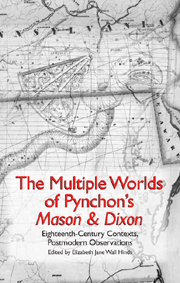 The Multiple Worlds of Pynchon's 'Mason and Dixon'
The Multiple Worlds of Pynchon's 'Mason and Dixon' from Enlightenment Microhistories
Published online by Cambridge University Press: 12 September 2012
THROUGHOUT HIS NOVELS, Thomas Pynchon combines strict fidelity to previously forgotten historical records with conjectural or fantastic narratives which nevertheless contribute to making a moral or political argument. In Mason & Dixon, he employs this characteristic strategy with events at the intersection between two kinds of narrative in eighteenth-century history. The first concerns labor history, and in particular the wages for weavers, who were among the first workers to experience the effects of an early industrializing economy. This narrative interest figures in Mason & Dixon because of the efforts of weavers in the southwest of England in late 1756 and early 1757 to obtain an increase or at least to avoid a decline in wages through group action such as strikes, public assemblies, and machine breaking. The second, intersecting strand at work in Pynchon's novel is military and imperial history, specifically the presence of Colonel (later General) James Wolfe in Stroud and surrounding areas of Gloucestershire to keep the peace in late 1756. Pynchon's account of the events that brought together the weavers and General Wolfe is striking and illuminating for the accuracy of many of its elements, for the way it re-animates this important episode in English history, and for its substantial inaccuracies and fictionalizing. Through this combination of scholarly accuracy and imaginative fabrication, Pynchon shows Mason and Dixon's ability to move outside their expected ideological positions, but he misses the opportunity to recognize Wolfe making the same step.
To save this book to your Kindle, first ensure [email protected] is added to your Approved Personal Document E-mail List under your Personal Document Settings on the Manage Your Content and Devices page of your Amazon account. Then enter the ‘name’ part of your Kindle email address below. Find out more about saving to your Kindle.
Note you can select to save to either the @free.kindle.com or @kindle.com variations. ‘@free.kindle.com’ emails are free but can only be saved to your device when it is connected to wi-fi. ‘@kindle.com’ emails can be delivered even when you are not connected to wi-fi, but note that service fees apply.
Find out more about the Kindle Personal Document Service.
To save content items to your account, please confirm that you agree to abide by our usage policies. If this is the first time you use this feature, you will be asked to authorise Cambridge Core to connect with your account. Find out more about saving content to Dropbox.
To save content items to your account, please confirm that you agree to abide by our usage policies. If this is the first time you use this feature, you will be asked to authorise Cambridge Core to connect with your account. Find out more about saving content to Google Drive.